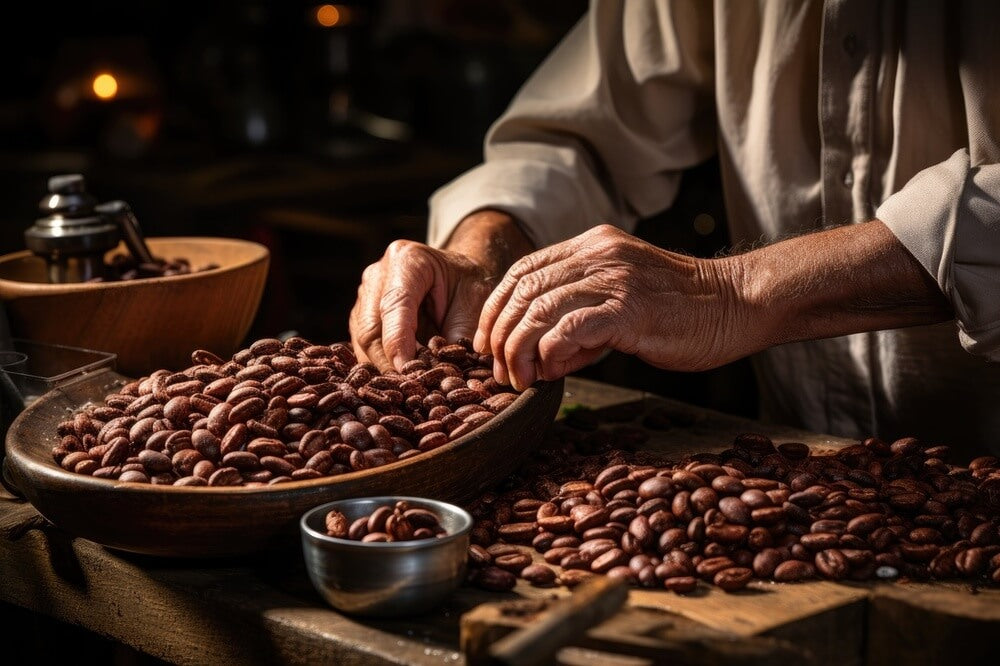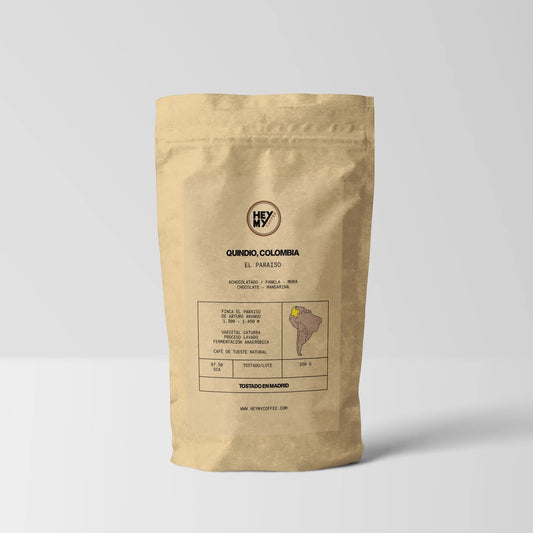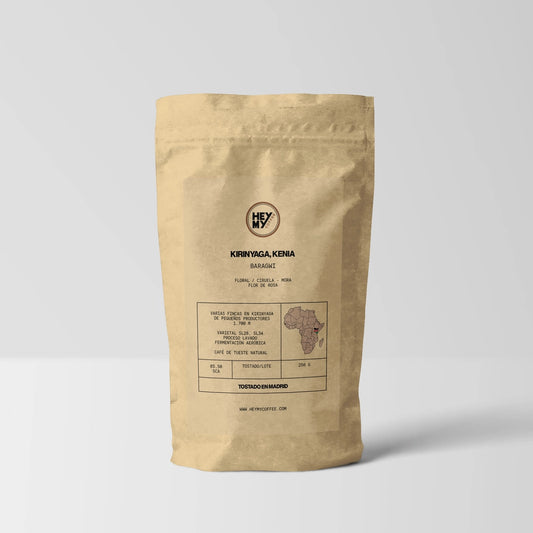
Exploring the Diversity of Flavors: Imported Specialty Coffee from Unique Origins
Compartir
In the world of coffee, there is a jewel that shines with its own light: specialty coffee . Its growing popularity is due to one fundamental reason: the tireless search for unique flavors and aromas.
In this sensory journey, the origins play a leading role, outlining the personality of each cup. Join us as we explore the diverse flavor profiles of imported specialty coffees from different origins, a journey that will take you from the mountains of Latin America to the distant lands of Asia and Africa.
The Basics of Specialty Coffee
Specialty coffee is distinguished from its conventional counterpart because of its focus on quality and uniqueness. The Specialty Coffee Association (SCA) establishes rigorous criteria for evaluating it, including a score above 80 points on a scale of 100 in aspects such as aroma, flavor, acidity, body and balance.
This category of coffee is characterized by passionate dedication to every stage of the process, from cultivation to cup. Producers meticulously care for the quality of the beans, carefully select processing and roasting methods, and strive to ensure precise brewing in every cup.
We can say that specialty coffee is a sensory experience that celebrates quality and uniqueness, transcending the mere drink to offer a journey of unique flavors and aromas.
More information: What is specialty coffee?
Exploring the Diverse Origins and Their Unique Flavors
Specialty coffee is a culinary experience influenced by the geographical origins of coffee, allowing us to appreciate a rich diversity of specialty coffee flavors and profiles.
From Latin America to Africa, Asia and beyond, each region offers its own contribution to the world of coffee flavors, giving its customers the opportunity to explore a spectrum of unique sensory experiences.
Latin America
It is known for its coffees with fruity and floral notes. Colombian coffees, for example, often exhibit a chocolatey sweetness with subtle hints of citrus. In contrast, Guatemalan beans can surprise with their fruity richness, but often accompanied by bright acidity.
Africa
It is the birthplace of some of the most intriguing coffee varieties. In Ethiopia, coffees are recognized for their fruity and floral flavors, with notes of jasmine, lemon and berries. Kenya offers citrus and earthy profiles that add depth to the coffee experience.
Asia
For its part, it contributes unique profiles. Coffees from Sumatra, Indonesia, often feature earthy and woody notes, with a pronounced body. Yemen, on the Arabian Peninsula, is known for its coffee with spicy undertones, but often with hints of cardamom and nutmeg.
These distinctive flavors are the result of a combination of factors, such as grain type, microclimate, altitude, and processing methods. Each origin tells its own story through its coffee, offering lovers of this drink an unparalleled journey around the world, in every cup. The diversity of specialty coffee flavors is an invitation to explore and celebrate the richness of our planet in a cup.

Processing and Cultivation Method: Influence on Flavor
Specialty coffee is prized for its distinctive flavor and the meticulous attention paid to its production. Two key factors that influence its exceptional flavor are:
Coffee processing
Fundamental for its flavor. The most common methods are the following:
- Washing: The pulp is removed before drying, creating a coffee with acidic notes and floral flavors.
- Natural: The coffee is dried with the pulp, resulting in a sweet and fruity flavor, with notes of berries.
- Honey: Some of the pulp is removed, leaving some mucilage, which adds honey, nutty or chocolate flavors.
Geographic location
It also plays an essential role. Let's see their main differentiations:
- Altitude: Coffee plantations at higher altitudes produce denser and more flavorful beans, with floral and citrus notes due to slower growth.
- Climate: A stable, predictable climate is ideal for specialty coffee, as climate variations can affect the ripening of cherries and therefore the flavor.
- Soil: The type of soil influences the flavor. Soils rich in minerals and nutrients provide coffee with a wider range of flavors and complexity.
We conclude that specialty coffee is a world of diverse flavors. The processing and growing method are critical to its unique flavor. Processing methods, such as washed, natural and honey, provide different flavor profiles. Additionally, the altitude, climate and soil of the growing location contribute significantly to the flavor of the coffee. High-altitude coffee plantations produce tastier beans, while a stable climate and nutrient-rich soils encourage flavor complexity. Because of this, each cup of specialty coffee is a unique sensory experience appreciated by coffee lovers.
Trends and Innovations in Specialty Coffee
The world of specialty coffee is constantly evolving, driven by trends and innovations that impact both the taste and sustainability of the industry.
As trends we highlight:
- Experimental Processes: Producers and roasters are exploring fermentation and carbonation processes to give coffee unique and complex flavors.
- Hybrid Varieties: New hybrid coffee varieties are being developed that resist diseases and maintain exceptional flavor profiles.
Impact of Technology and Sustainability
- Roasting technology: Modern technology allows for precise and consistent roasting, guaranteeing quality from source to cup.
- Sustainability: Producers adopt ecological and fair trade practices, while consumers seek direct trade and relationship coffee.
- Sustainable Packaging: Compostable and reusable packaging is developed to reduce environmental impact.
In short, specialty coffee is constantly reinventing itself. Trends focus on innovative processes and new varieties, along with a focus on technology and sustainability. These changes are shaping an exciting future for specialty coffee, where quality and environmental responsibility are key.
The Consumer Experience: Preparation and Tasting
The full appreciation of specialty coffee requires proper preparation and tasting. Here we share key tips to make the most of this experience.
Proper Preparation
Each coffee maker has its specific procedure, which we explain in the following article: Preparation of specialty coffee
Now, we tell you some of the tips that apply to all methods:
- Fresh Grinding: Grind the beans just before preparation. The proper grind size varies depending on the brewing method (for example, coarse for French press and fine for espresso).
- Ratio and Water: Use the proper ratio of coffee to water. The general rule of thumb is approximately 30 grams of coffee per 500 ml of water. Use hot, but not boiling, filtered water (between 90-96°C).
- Time and Control: Follow the recommended extraction time for your brewing method. Control temperature and time precisely to avoid over-grinding or under-extraction.

Tasting Highlighting Notes and Nuances
- The Right Mug: Use a ceramic or glass mug, avoiding plastic, which can affect the flavor.
- Aroma and Fragrance: Enjoy the aroma before trying. Gently shake the cup and breathe deeply to appreciate the aromatic notes.
- Slurp and Rinse: When tasting, make a “slurp” to suck the coffee into your mouth and coat all your taste buds. Rinse your mouth with the coffee to evaluate its flavor from front to back.
- Note Identification: Take time to identify notes and nuances. Pay attention to acidity, body, sweetness, and specific flavors that may vary depending on the origin.
- Observation Log: Keep a log of your observations for each coffee you try. This will help you learn and compare flavor profiles over time.
Preparing and tasting specialty coffee is an art in itself. With proper attention to grind, proportion, timing, and tasting technique, you can fully enjoy the unique notes and nuances of each origin, creating a rewarding sensory experience that values the effort and craftsmanship behind each cup.
The Role of Sustainability and Fair Trade
The full appreciation of specialty coffee requires proper preparation and tasting. Here we share key tips to make the most of this experience.
Importance of Sustainability and Fair Trade
- Environmental Preservation: Sustainable practices promote the conservation of ecosystems and biodiversity, reducing the environmental footprint of coffee production.
- Social Impact: Fair trade ensures fair working conditions and adequate wages for coffee farm workers, improving the quality of life for local communities.
- Coffee Quality: Sustainability also translates into the quality of the coffee. Responsible growing and processing practices contribute to the production of high-quality grains.
How Consumers Can Make an Informed Coffee Choice
- Certifications: Look for coffee with certifications like Fair Trade, Rainforest Alliance, or UTZ, which indicate sustainable practices and fair trade.
- Responsible Origin: Research the farms and producers behind coffee brands. Some specialty coffee brands pride themselves on their direct relationships with producers, which promotes greater transparency and sustainability.
- Local Consumption: Support local or regional producers who follow sustainable practices. This reduces the carbon footprint associated with international transportation.
- Consumer Awareness: Educate yourself about the importance of sustainability and fair trade in the coffee industry and share that knowledge with other consumers.
In summary, sustainability and fair trade are essential pillars in the specialty coffee industry. Consumers can contribute to positive change by choosing coffee with certifications, researching provenance and supporting responsible producers. By doing so, they not only enjoy exceptional coffee, but also contribute to a fairer and more sustainable world for everyone involved in the coffee supply chain.
Exploring New Experiences: Origen Recommendations to Try
The world of specialty coffee is an exciting journey full of unique flavors and exceptional profiles. Here we offer you some suggestions for notable coffees from different origins to inspire you to explore and discover new flavors.
Africa
- Ethiopia: The birthplace of coffee, Ethiopia, offers a diversity of amazing flavors. Try a specialty Ethiopian coffee to experience fruity and floral notes, with bright acidity that will transport you to its mountains.
Latin America
- Colombia: Colombia is famous for its smooth, balanced coffee with notes of nuts and cocoa. It is an ideal starting point for those exploring specialty coffees for the first time.
Central America
- Costa Rica: This country stands out for its high-altitude coffees, which offer citrus and fruity flavors. Try a Costa Rican coffee for a bright and refreshing experience.
Exploring specialty coffee is a journey full of surprises and discoveries. Each origin offers a world of unique flavors that reflect the geographical conditions and the dedication of the producers. We invite readers to venture beyond the conventional, to try coffees from different regions and to savor the diversity this world has to offer. Each cup is an opportunity for a new experience and a sensory journey that will enrich your appreciation for specialty coffee. So, go ahead and explore and enjoy every sip!

In summary,
In the world of specialty coffee, each cup is a sensory journey that takes us through an infinite diversity of flavors and nuances. We have explored how processing methods and growing at high altitudes, climate and soil influence flavor formation. We have highlighted the diverse origins of coffee, from Latin America to Africa and Asia, each with its own identity and distinctive notes. We have also examined innovative trends shaping the industry, such as new processes and sustainable practices.
At HeyMyCoffee , as passionate specialty coffee roasters, we are committed to offering exceptional products that capture the essence of each origin and highlight the unique flavors we mentioned above. Our coffees are carefully selected from around the world and precision roasted to highlight their distinctive flavor profile. We invite you to enjoy the unique experience that each HeyMyCoffee cup provides and explore the cultural and sensory richness that specialty coffees have to offer.
Embark on a journey of exploration and discovery through our products.
Try our coffees from different origins and experience the adventure of unique flavors that we offer. Each cup is an invitation to appreciate and enjoy the uniqueness of each producing region, backed by the quality and commitment of HeyMyCoffee. Take the opportunity to immerse yourself in the cultural and sensory richness that specialty coffees have to offer with us. Each sip is an open door to a world of flavors waiting to be discovered, a truly unique experience that will enrich your senses and bring you even closer to the exciting universe of specialty coffee.
We are waiting for you at HeyMyCoffee to explore this exciting coffee journey together!




